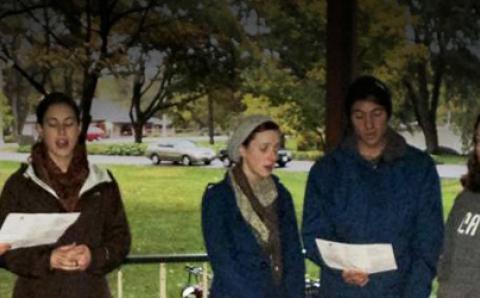As missionaries with Christian Reformed World Missions, we typically have three-year rotations. After two-and-a-half years on the field, we spend the remaining six months doing ministry and reporting to our partner churches and individuals in North America.
Members of First CRC in Wellsburg examine food that’s new to them.
This year our family started home service in February, traveling weekly to one of our 18 partner churches and letting them know how God connects and equips the Nigerian leaders and organizations with whom we work for positive transformation.
During these visits, we also listen to church members talk about their experiences. They often highlight how “anywhere is everywhere” nowadays. In Sioux City, Iowa, one church member told us, “I’ve lived in Kenya before. I’ve met more Somalians here in Sioux City than I did during our time in East Africa.”
Speaking of other cross-cultural experiences, a member from Sanborn CRC in Iowa said, “I felt uncomfortable when they kept trying to hug us.” “They didn’t like our food!” said another.
These responses and others remind us that as Christian Reformed congregations in North America experience increasing diversity, it is important that we continue to gain awareness for cross-cultural communication.
So along with listening in our partner churches, we encourage a rich dialogue by presenting a cross-cultural simulation.
We explain how, as guests, we follow the lead of our Nigerian co-laborers, walking together in mission. Respectful cross-cultural communication—how and what we say verbally and nonverbally—can strengthen or weaken relationships.
We ask church members, young and old, to divide into four groups, each receiving a list of cultural traits unique to a specific ethnic group. Each group has the same task—saying hello, saying goodbye, finding an item of beauty, and sharing or receiving food.
The fun gets underway when the groups representing different cultures visit each other and move through their differences—often with courage and humor as well as anxiety and caution.
As they visit, one culture may say that they expect direct eye contact, while the other considers such directness offensive. People in one culture may hug strangers, while the other culture avoids that type of hugging, which can then draw a response from the initial culture. “I was hurt when they didn’t accept our way of greeting,” exclaimed a gentleman from Rock Rapids CRC, Iowa.
Some giggle, others scowl, some dive in, and others pull back. Some are boisterous, and others become pensive during the simulation.
Afterward, we discuss the phrase “it’s not wrong, it’s just different,” and reflect on how we can look through the lens of Scripture to discern faithful responses, rather than pushing one uniform way when responding to cultural differences.
A member from Ridgewood CRC in New Jersey said, “I have a new appreciation for the work of missionaries.”
Another said, “I will definitely be more aware in my relationships with others. I am even wondering how practices during our worship service communicate to new people visiting.”
About the Author
Christian Reformed World Missions








